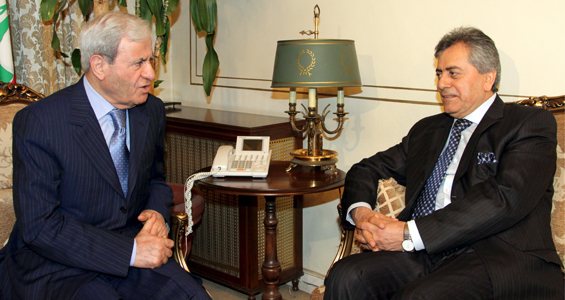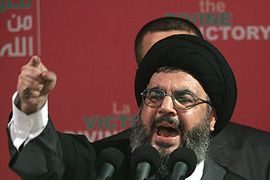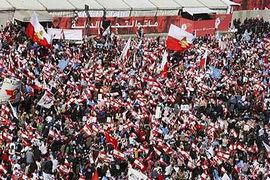New names, same games for Lebanon
Syria’s opponents in Lebanon ‘made all the right mistakes’, says analyst Rime Allaf.

 |
| Ali Abdul-Karim Ali, right, Syria’s first ambassador to Lebanon, met Fawzi Saloukh, Lebanon’s foreign minister, in May after both countries opened embassies in each other’s capital cities [EPA] |
It is difficult to pinpoint exactly when the discourse about Syria and Syrian-Lebanese relations became simplistic to the point of ridicule, given that sweeping statements had been the norm even before the assassination of Rafiq al-Hariri, Lebanon’s former prime minister, in February 2005.
After the United Nations Security Council resolution 1559 was passed in September 2004 – putting Syria in breach of international law for the first time with its stipulation that all foreign forces leave Lebanon – the rhetoric began to reflect the extremes of two main camps vying for influence over Lebanon.
| In depth | ||
IN VIDEO INTERACT |
On one side, sits the anti-Syrian March 14 faction that currently holds the majority of parliamentary seats. March 14 shares the ‘values’ of a post-9/11 world which the administration of George Bush, then US president, allegedly espoused.
On the other side, lies the pro-Syrian, Hezbollah-led March 8 camp who have put themselves on the political map by refusing to renounce armed resistance to Israeli aggression.
Both factions decried foreign interference in Lebanese affairs and accused their political opponents of failing to put Lebanon first.
In fact, both were right to lament the other’s reliance on support from foreign powers, which made their respective slogans about freedom, independence and sovereignty sound equally moot.
The supporters of the Cedar Revolution, the March 14 camp, hastily rebranded their campaign when it became clear their former slogan – “Independence Intifada” – inadvertently echoed the original intifada in the occupied Palestinian territories, which was deemed to be not so cool.
In contrast, the March 8 group was mostly unchoreographed and unscripted, and its insistence on thanking Syria for its long role in Lebanon, as Syrian forces finalised their withdrawal, was considered pure provocation.
Syria-Lebanon relaions
The jury is still out about the definitive version of Syria’s role in Lebanon. Even with the lack of historical perspective and with official Syrian admissions that mistakes were made, it is impossible to take at face value the unending supply of stories, rumours and deductions about alleged Syrian crimes.
Indeed, March 14 forces have automatically attributed each and every criminal incident, every assassination and every bomb to Syria, or lately to its allies within Lebanon.
They claim pro-Syrian factions want to terrorise Lebanon into submitting to supposed Syrian objectives while derailing national reconciliation negotiations.
Even the lamentable events which led to the Lebanese army’s destruction of the Palestinian refugee camp of Nahr al-Bared were blamed on Syria.
 |
| Both opposing factions accuse the other of failing to put Lebanon first [GALLO/GETTY] |
If it were not for Syria, apparently, the Lebanese would be living in a unique, crime-free, honest, morally-driven and ethical democracy, convening national dialogue on every issue and agreeing to disagree while maintaining fluidity in their state affairs and government plans.
Allegations about multiple Syrian crimes without providing proof have been a continuous feature of the March 14 faction’s commentary on Syrian intentions with regard to Lebanon.
Influence in Lebanon is both a means to an end and an end in itself, Syria’s critics say, and proven culpability for the assassination of al-Hariri would seriously hinder this objective.
With each alleged criminal action, goes the March 14 tale, Syria is attempting to jeopardise the work of the tribunal investigating the al-Hariri assassination and blackmail Lebanon into taking Damascus’s side.
The shock was understandable, therefore, when after years spent languishing in jail without even being charged, the four Lebanese generals who were the only designated suspects were released mere weeks before the parliamentary election on June 7.
In a process which Syria condemned as politicised from the start, it was ruled there was insufficient evidence to try the generals.
Despite this, there seems to be little wish to tone down the rhetoric.
No sooner had the generals come out of jail than an article appeared in a German weekly claiming that it was Hezbollah, after all, which organised the al-Hariri assassination. Or so said the mysterious “sources” quoted.
Many observers consider this accusation to be merely a renewed attempt to influence the outcome of the parliamentary election.
Pandora’s box
Of much bigger importance is the issue of Lebanese military officials spying for Israel which is, of course, a Pandora’s box whose lid is only beginning to open with the arrest of a colonel who has admitted the charges.
Amid the crescendo of accusations about Syria and its allies, Israel remains the biggest threat to Lebanon. The savage Israeli war on Lebanon in July 2006 sent droves of Lebanese refugees across the Syrian border, where they were welcomed with open arms and homes.
Not only did this war bring back a dose of reality about the real security threats, it also put Lebanon’s current majority in a difficult position by pitting it against Hezbollah and so, effectively, on Israel’s side.
The war was a turning point where real alliances could not remain in the background any longer. On Hezbollah’s side sits Syria and Iran while the majority is backed by Saudi Arabia, Egypt and other western allies – particularly the US and France – who have made little secret of their wish to see Hezbollah smashed.
No matter how it was packaged, and even if the war was indirectly blamed on Hezbollah for having provoked Israel by seizing its soldiers, the enormity of this situation was unprecedented.
It laid the ground for the next big crisis which would hit Lebanon in May 2008, when the majority and the opposition faced each other as armed groups rather than as political parties. Hezbollah used its arms internally for the first time.
The denouement of that crisis, arranged by Qatar, was in effect a truce signed by the Lebanese on behalf of their different sponsors and supporters.
In the days following the Taif agreement which ended the Lebanese civil war and established Syria as the de facto boss, most parties complied with the so-called S-S dynamic; as long as Syria and Saudi Arabia agreed on the path to follow, Lebanon was relatively quiet.
Foreign interference
Today, while the major regional players are the same, they are betting on different horses.
The majority coalition and the opposition are representing the interests of foreign patrons, and the long-term goals those sponsors have for the region as a whole.
However, the nature of Lebanon’s consociational electoral system which guarantees proportional representation for all groups in parliament, make elections less open to influence. There can be no landslides for any one faction.
 |
| Some believe Biden’s visit was an attempt to deter people from voting for Hezbollah [AFP] |
Until there is a new census reflecting current demographics, most groups in the country are secure in the fact that they have a voice in government.
But it does matter, of course, who wins the most seats and is then charged with forming a government. Many observers wonder whether Hezbollah’s time as the majority faction has come.
Given clumsy foreign interference – including a pointless visit to Beirut by Joe Biden, the US vice-president, aimed at turning people away from voting for Hezbollah and its allies – there seem to be real questions on the latter’s capacity or even desire to reach office.
While General Michel Aoun, a Maronite and leader of the Free Patriotic Movement, would certainly welcome a presidential role, Hezbollah would probably be happy to remain in opposition, especially since it has already proved its capacity to overturn decisions when needed.
In opposition, the party is not under the immediate and constant pressure of having to forego its weapons and it can still participate in the decision-making process.
This situation would also serve Syria’s interests for the time being.
Although Damascus has been accused of trying to influence the election, this is, in reality, one of the times when it least needs to coax its allies and its foes into nominating an agreeable prime minister.
Rumour has it that a figure such as Najib Mikati, a former prime minister and acceptable to both extremes, is already a strong contender.
As the last couple of years have demonstrated, nothing in Lebanon was resolved until all interested parties, especially Syria, were on board.
Renewed confidence
Even Syrians themselves could not have imagined four years ago that the period of relative calm experienced today would have been possible.
With diplomatic relations finally established after Lebanon and Syria opened embassies in each other’s capitals in 2009 – and with confidence returning even on a popular level as Syrians feeling safe, if not completely welcome, in Lebanon, these are times of renewed belief in the power of regional alignments.
 |
| Lebanon’s 2005 Cedar Revolution was triggered by the assassination of al-Hariri [AFP] |
Even without their own man in office in Lebanon, the Syrians know there is now little room for any government to provoke it on the big issues. Damascus needs only to wait for the other foreign powers to come to terms with this reality.
Saudi Arabia has already organised a public reconciliation with Syria. France was the first Western power to rekindle relations after a few bad years.
If the Obama administration eventually delivers on its own promises for change, we are about to see a different regional understanding which brings all the neighbours on board.
As far as Syria is concerned, its opponents have so far made all the right mistakes and have now relegated the al-Hariri tribunal to the back burner.
With enemies like these, who needs friends?
The opinions expressed in this article are the author’s own and do not necessarily reflect Al Jazeera’s editorial policy.

 The battle for votes
The battle for votes